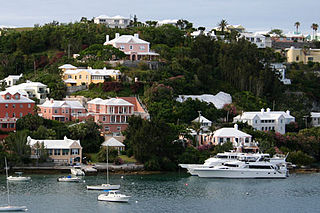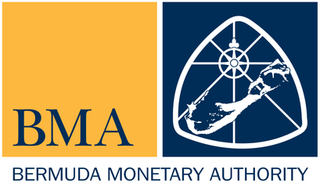Related Research Articles

Bermuda is a British Overseas Territory comprising a number of islands, with an area of 54 km2 (20.8 sq mi), located in the North Atlantic Ocean, which in 2016 had a population of 65,331.

The Financial Services Authority (FSA) was a quasi-judicial body accountable for the regulation of the financial services industry in the United Kingdom between 2001 and 2013. It was founded as the Securities and Investments Board (SIB) in 1985. Its board was appointed by the Treasury, although it operated independently of government. It was structured as a company limited by guarantee and was funded entirely by fees charged to the financial services industry.

The Central Bank of Ireland is the Irish member of the Eurosystem and had been the monetary authority for Ireland from 1943 to 1998, issuing the Irish pound. It is also the country's main financial regulatory authority, and since 2014 has been Ireland's national competent authority within European Banking Supervision.

The Bermuda Monetary Authority is the integrated regulator of the financial services sector in Bermuda. It is not a central bank, and does not provide lender of last resort facilities.

Anglo Irish Bank was an Irish bank headquartered in Dublin from 1964 to 2011. It began to wind down after nationalisation in 2009. In July 2011 Anglo Irish merged with the Irish Nationwide Building Society, forming a new company named the Irish Bank Resolution Corporation. Michael Noonan, the Minister for Finance stated that the name change was important in order to remove "the negative international references associated with the appalling failings of both institutions and their previous managements".
John Ignatius Quinn, commonly known as Seán Quinn, is an Irish businessman and conglomerateur. In 2008 he was the richest person in the Republic of Ireland, but in 2012 he was declared bankrupt.

The Office of Thrift Supervision (OTS) was a United States federal agency under the Department of the Treasury that chartered, supervised, and regulated all federally chartered and state-chartered savings banks and savings and loans associations. It was created in 1989 as a renamed version of the Federal Home Loan Bank Board, another federal agency. Like other U.S. federal bank regulators, it was paid by the banks it regulated. The OTS was initially seen as an aggressive regulator, but was later lax. Declining revenues and staff led the OTS to market itself to companies as a lax regulator in order to get revenue.
Irish Nationwide Building Society was a financial institution in Ireland from 1873 to 2011. One of the country's oldest financial institutions, it was originally called the Irish Industrial Building Society; it changed its name in 1975 when it had just five staff. It ceased to exist when its assets, liabilities and branch network were transferred to Anglo Irish Bank.

The Financial Regulator, officially the Irish Financial Services Regulatory Authority, was the single regulator of all financial institutions in Ireland from May 2003 until October 2010 and was a "constituent part" of the Central Bank of Ireland. It was re-unified with the Central Bank of Ireland on 1 October 2010 and its board structure was replaced by a new Central Bank of Ireland Commission.

Chartered Accountants Ireland was established by Royal Charter on 14 May 1888, and is Ireland's largest accountancy body. According to its website, it represents over 30,000 members globally.

The Federal Financial Supervisory Authority, better known by its abbreviation BaFin, is Germany's integrated financial regulatory authority. Since 2014, it has been Germany's national competent authority within European Banking Supervision. It is an independent federal institution with headquarters in Bonn and Frankfurt and falls under the supervision of the Federal Ministry of Finance. BaFin supervises about 2,700 banks, 800 financial services institutions, and over 700 insurance undertakings.
Mannok, formerly the QUINN group, is a business group headquartered in Derrylin, County Fermanagh, Northern Ireland. The group has ventured into cement and concrete products, container glass, general insurance, radiators, plastics, hotels, and real estate. It was formed by Seán Quinn in 1973, developing from a small quarrying operation in Derrylin into a large organization, employing over 8,000 people in various locations throughout Europe.

The European Insurance and Occupational Pensions Authority (EIOPA) is a European Union financial regulatory agency. It was established in 2011 under Regulation (EU) No 1094/2010.
The Committee of European Securities Regulators (CESR) was an independent committee of European Securities regulators, in place from 2001 to 2010. On 1 January 2011, it was replaced by the European Securities and Markets Authority (ESMA).
The Committee of European Banking Supervisors (CEBS) was an independent advisory group on banking supervision in the European Union (EU), active from its establishment in 2004 to its replacement on 1 January 2011 by the European Banking Authority (EBA) which took over all its tasks and responsibilities following Regulation (EC) No. 1093/2010 of the European Parliament and of the Council of 24 November 2010.

The Financial Conduct Authority (FCA) is a financial regulatory body in the United Kingdom. It operates independently of the UK Government and is financed by charging fees to members of the financial services industry. The FCA regulates financial firms providing services to consumers and maintains the integrity of the financial markets in the United Kingdom.
The Prudential Regulation Authority (PRA) is a United Kingdom financial services regulatory body, formed as one of the successors to the Financial Services Authority (FSA). The authority is responsible for the prudential regulation and supervision of banks, building societies, credit unions, insurers and major investment firms. It sets standards and supervises financial institutions at the level of the individual firm. Although it was initially structured as a limited company wholly owned by the Bank of England, the PRA's functions have now been taken over by the Bank and are exercised through the Prudential Regulation Committee. The company has since been liquidated.
Martin Wheatley is a British financier, formerly managing director of the Consumer and Markets Business Unit of the Financial Services Authority in the UK, and is the former CEO of the Financial Conduct Authority.

The European Banking Authority (EBA) is a regulatory agency of the European Union headquartered in La Défense, Île-de-France. Its activities include conducting stress tests on European banks to increase transparency in the European financial system and identifying weaknesses in banks' capital structures.
Cyril Roux has been the Deputy Governor of the Central Bank of Ireland, a position more commonly known as "the Financial Regulator" since 1 October 2013. Mr Roux was the First Deputy Secretary General of the French prudential supervisory authority for banks and insurance companies (ACPR) since the authority was created in March 2010. Prior to joining ACPR, he was the Deputy Secretary General of the French insurance supervisory authority and spent 10 years at AXA in a variety of posts. He replaced outgoing regulator Matthew Elderfield, who took up a new job at Lloyds Banking Group. Mr Roux has been appointed on a five-year contract with an annual salary of €310,000.
References
- 1 2 3 "Appointments:Matthew Elderfield, Central Bank". businessandleadership.com. 20 October 2009. Archived from the original on 18 April 2010. Retrieved 19 April 2010.
- ↑ Quinlan, Ronald (16 May 2010). "Financial watchdog reveals his lack of a specialist qualification". Irish Independent.
- ↑ Simon Carswell (24 October 2009). "Financial watchdog's impeccable pedigree". The Irish Times . Retrieved 19 April 2010.
- ↑ Noonan, Laura (8 June 2010). "Regulator helped supervise Northern Rock before bailout". Irish Independent.
- ↑ Simon Carswell (19 March 2010). "Unenviable task in taming the banks". The Irish Times . Retrieved 19 April 2010.
- ↑ http://www.independent.ie/opinion/analysis/old-practices-at-central-bank-are-holding-back-new-ireland-2634785.html>
- ↑ "Neary to retire as Regulator". RTÉ . 9 January 2009. Retrieved 20 April 2010.
- ↑ Charlie Weston (20 October 2009). "Central Bank appoints Englishman to top job". Irish Independent . Retrieved 21 October 2010.
- ↑ "New Chief Executive". Financial Regulator. 4 January 2010. Archived from the original on 1 January 2011. Retrieved 19 April 2010.
- ↑ "Bank watchdog pledges tough approach". RTÉ . 11 March 2010. Retrieved 19 April 2010.
- ↑ "Has Matthew Elderfield restored the credibility of the Financial Regulator's office?". The Irish Times. Retrieved 19 April 2010.
- ↑ "Regulator lacking top-level graduates". Irish Independent. 18 April 2010.
- ↑ Eoin Burke-Kennedy (30 March 2010). "Irish banks may require up to €32 billion to cover losses". The Irish Times . Retrieved 19 April 2010.
- ↑ "Statement on Quinn Insurance". Financial Regulator. 30 March 2010. Archived from the original on 18 June 2012. Retrieved 19 April 2010.
- ↑ Maeve Sheehan (4 April 2010). "Industry captain's ill-fated voyage on the sinking ship". Irish Independent . Retrieved 19 April 2010.
- ↑ "Statement from QUINN-group – adjournment of hearing". Quinn Group. 12 April 2010. Archived from the original on 19 September 2010. Retrieved 19 April 2010.
- ↑ Ciara O'Brien (15 April 2010). "Quinn to 'accept administration'". The Irish Times . Retrieved 19 April 2010.
- ↑ Emmet Oliver (15 April 2010). "Watchdog tells Quinn: Show me the money". Irish Independent . Retrieved 19 April 2010.
- ↑ "Profile". Irish Independent. 6 January 2011.